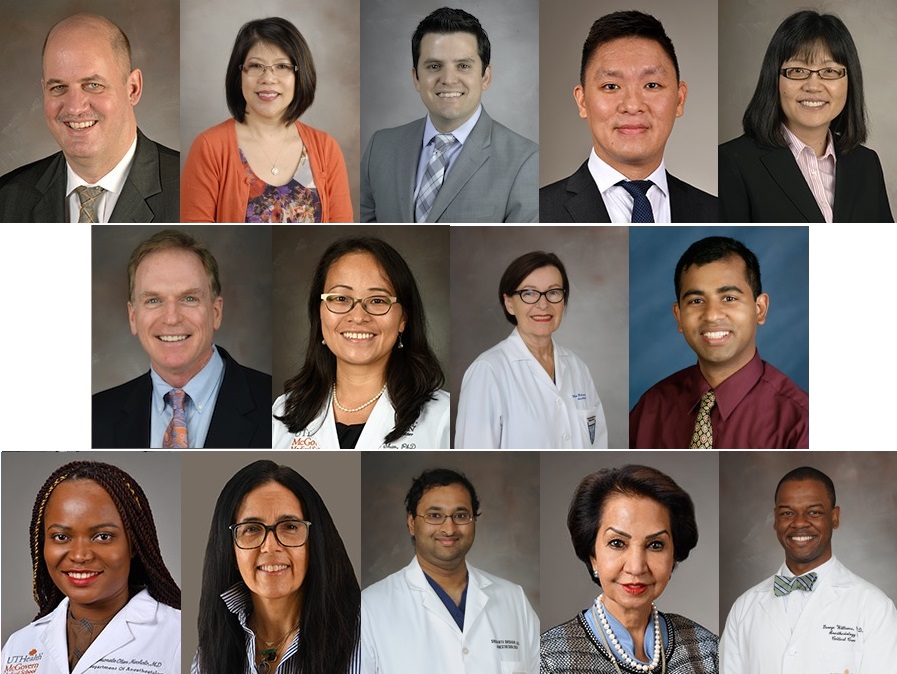Anesthesiology updates department name

The McGovern Medical School’s Department of Anesthesiology now has a more comprehensive name to reflect the full scope of the department’s mission. The Department of Anesthesiology, Critical Care and Pain Medicine name went into effect Oct. 2, 2022, following approval by Executive Dean John Hancock.
“We feel that the new name more accurately reflects the core mission and focus of our department,” explained Holger Eltzschig, MD, PhD, chair of the department and holder of the John P. and Kathrine G. McGovern Distinguished University Chair.
The name change represents the evolution of the department’s collective efforts, including participation and leadership in multiple intensive care units and pain medicine services.
The department has expanded its expertise in critical care and pain medicine, adding 15 critical care board-certified faculty members who support seven intensive care unit services, spanning three affiliated hospitals of UTHealth. Another 14 faculty are significantly involved in pain medicine, caring for patients in both Memorial Hermann-TMC and Lyndon B. Johnson Hospital.
“Anesthesia covers a large breadth of specialties, and a very important part is the treatment of chronic pain or pain in general. Our department encompasses the entire perioperative care process from pre-op to post-surgery, including chronic pain issues,” said Grant Chen, MD, MBA, chief, of chronic pain, and associate professor of anesthesiology, critical care, and pain medicine.
“Critical care and anesthesiology are synonymous in so many ways. The initiation, or continuation, of critical care management starts, or seamlessly continues, in the operating room every day. We are proud to have deep partnerships with our sister departments at McGovern to provide excellent critical care services, including the Departments of Surgery, Emergency Medicine, Neurosurgery, and the Division of Pulmonary and Critical Care Medicine. This ensures that our patients can receive outstanding critical care medicine treatments, in harmony and synergy with the high level of expertise in intraoperative management that our department provides every day,” said George Williams, MD, FASA, FCCM, FCCP, vice chair and chief of Critical Care Medicine and professor of Anesthesiology, Critical Care and Pain Medicine, who also serves as the current president of the Texas Society of Anesthesiology.
In addition to the clinical component, the department has broadened its research arm to include various aspects of critical care and disease states, including perioperative injury of the heart, kidney, and liver; acute respiratory distress syndrome due to infections and surgery; and inflammatory organ damage of the intestine and pancreas. The team also is making strides in understanding the mechanisms of chronic diseases, such as obesity, Alzheimer’s disease, and cancer. The department’s independently funded investigators have amassed nearly $20M in NIH funding.
“The research enterprise in our department is not limited to anesthesia, but rather encompasses many aspects of critical care and perioperative organ injury that are related to the anesthesiology specialty,” explained Cynthia Ju, PhD, professor, departmental vice chair for research, and Joseph C. Gabel, MD Endowed Chair in Anesthesiology. “We currently have nine NIH-funded independent laboratories performing basic and translational research.”
Reflecting on this growth, the department’s executive team suggested the name change, which mirrors a trend among many leading departments in perioperative medicine. In addition to final approval by Dean Hancock, the initiative was supported by President Giuseppe Colasurdo and Dr. Kevin Morano, senior vice president, and chief academic officer, ad interim.
The expanded scope and name will help patients and potential faculty to better understand the department’s mission.
“It’s important for patients to realize the breadth and the scope of what we do. We want diverse faculty to be represented in our department. A comprehensive name for our department helps with attracting such individuals and recruiting national leaders in those areas, including anesthesiology, critical care, and pain medicine,” Eltzschig said. “Even though the department’s name has been changed to reflect our diversified mission, our collective focus on excellent patient care, training the next generation of health care providers in perioperative medicine, interdisciplinary collaboration, and world-class leadership in organ injury, critical care, and chronic diseases states that affect perioperative medicine remains unchanged.”